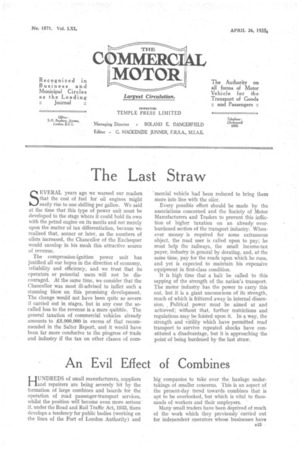The Last Straw
Page 33

If you've noticed an error in this article please click here to report it so we can fix it.
SEVERAL years ago we warned our readers that the cost of fuel for oil engines might easily rise to one shilling per gallon. We said at the time that this type of power unit must be developed to the stage where it could hold its own with the petrol engine on its merits and not merely upon the matter of tax differentiation, because we realized that, sooner or later, as the numbers of oilers increased, the Chancellor of the Exchequer would envelop in his mesh this attractive source of revenue.
The compression-ignition power unit has justified all our hopes in the direction of economy, reliability and efficiency, and we trust that its operators or potential users will not be discouraged. At the sane time, we consider that the Chancellor was most ill-advised to inflict such a stunning blow on this promising development. The change would not have been quite so severe if carried out in stages, but in any case the socalled loss to the revenue is a mere quibble. The general taxation of commercial vehicles already amounts to £5,000,000 in excess of that recommended in the Salter Report, and it would have been far more conducive to the progress of trade and industry if the tax on other classes of com mercial vehicle had been reduced to bring them more into line with the oiler.
Every possible effort should be made by the associations concerned and the Society of Motor Manufacturers and Traders to prevent this infliction of higher taxation on an already overburdened section of the transport industry. Whenever money is required for some extraneous object, the road user is called upon to pay; he must help the railways, the small income-tax payer, industry in general by derating, and, at the same time, pay for the roads upon which he runs, and yet is expected to maintain his expensive equipment in first-class condition.
It is high time that a halt be called to this sapping of the strength of the nation's transport. The motor industry has the power to carry this out, but it is a giant unconscious of its strength, much of which is frittered away in internal dissension. Political power must be aimed at and achieved; without that, further restrictions and regulations may be foisted upon it. In a way, the strength and virility which have permitted road transport to survive repeated shocks have constituted a disadvantage, but it is approaching the point of being burdened by the last straw.




































































































